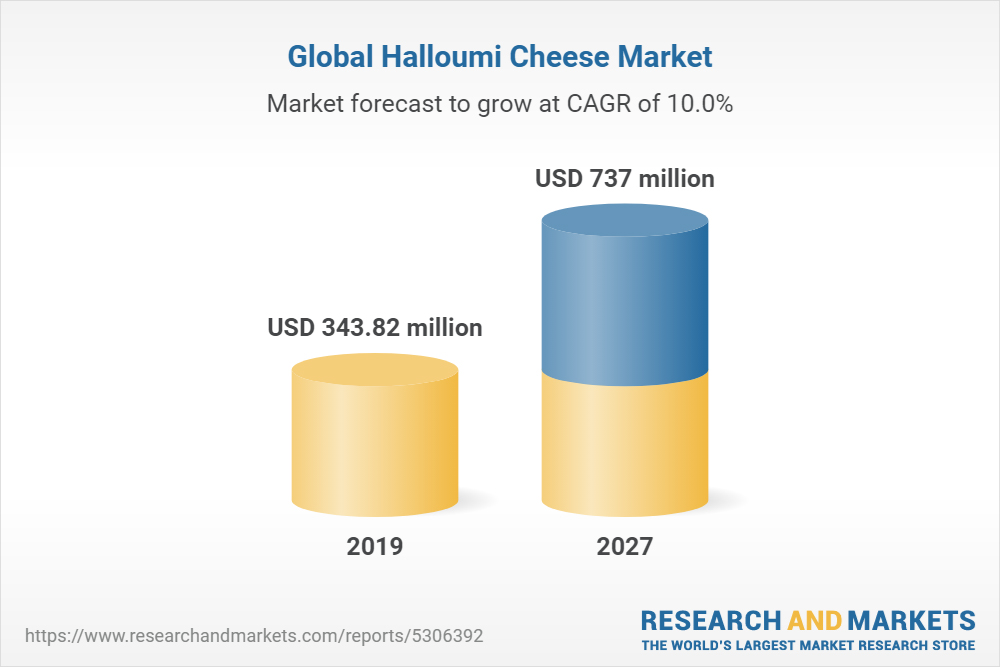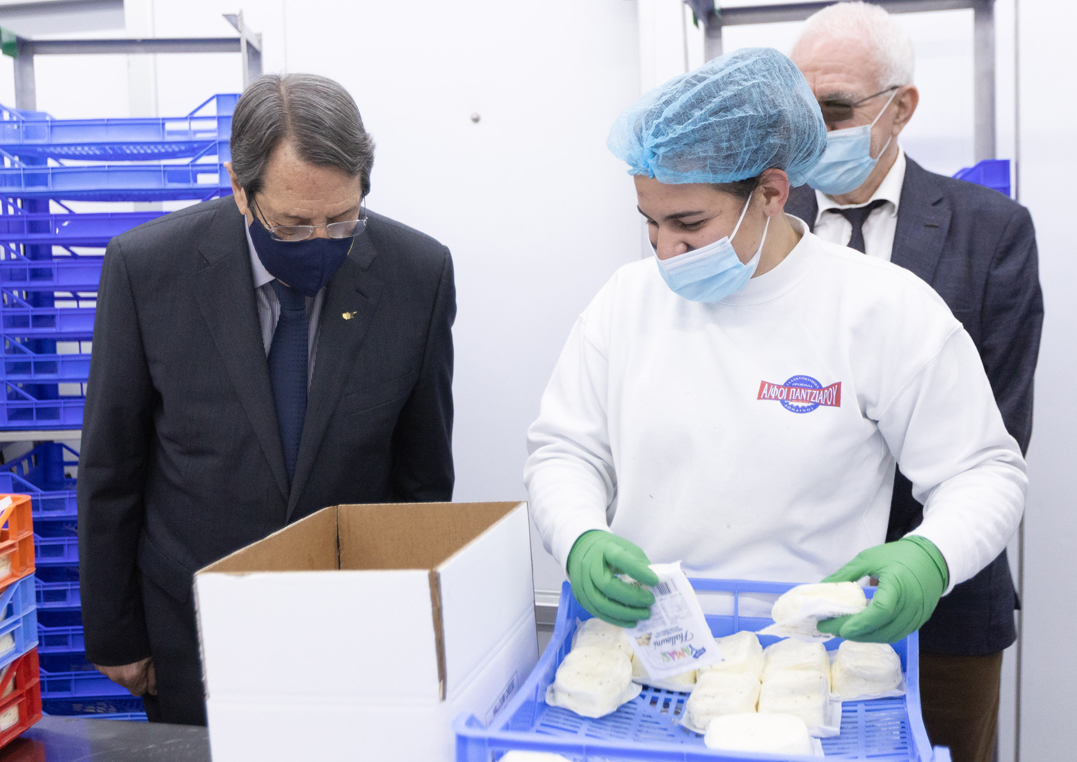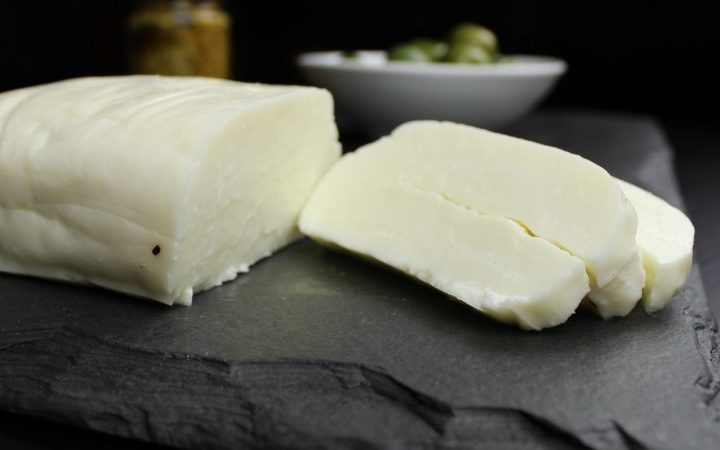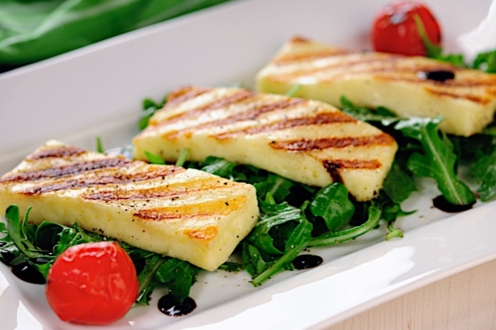Halloumi, the Cyprus traditional cheese, has joined the world’s elite of ‘native’ quality foodstuff as after years of disagreement, the European Union awarded the Protected Designation of Origin (PDO) badge, with halloumi makers in Cyprus poised to see their exports nearly double.
Shielded behind the newly acquired PDO status, Cyprus traditional cheese makers can now make the most from the ever growing market, as authorities will be able to fend off imitators to the crown.
Cyprus halloumi exports yielded a whopping €270 mln last year, breaking all previous records, while Agriculture Ministry estimates valued the global halloumi cheese market at €420 mln.
According to Dublin-based Researchandmarkets.com, the halloumi market is projected to nearly double in six years’ time to reach $737.0 mln by 2027, registering a compound annual growth rate (CAGR) of 10.0% from 2021 to 2027.
The study showed that key players in the halloumi cheese industry profiled in the report are Petrou Bros Dairy Products Ltd., Zita Dairies ltd., Hadjipieris Ltd., Galaktokomio A.D.S Dafni Ltd., all in Cyprus. They are followed by Arla foods in Denmark, Almarai (Saudi Arabia) and Nordex Foods A/S (Denmark).
According to the available data, the exports of Cyprus halloumi in the last five years show a steady annual increase of 20-22%. In the 2017 – 2019 period, the volume of exports jumped from 23,431 tons in 2017 to 33,672 tons in 2019, marking an increase of 43% in just three years.
A corresponding increase in the quantity of exports is observed in value, 43% during the three-year period, reaching €223.7 mln in 2019 and making halloumi the second most important product in terms of export value for Cyprus, after medicines.
In comments to the Financial Mirror, Panayiota Patsali, head of the Energy and Trade Ministry’s Commerce Department confirmed that authorities expect Cyprus’ traditional cheese’s exports to be further boosted by the development.
Patsali argued that the PDO status will help authorities fend off imitators, paving the way for local producers to claim the market share previously held by others.
“As it is now clear, when it comes to the EU, ‘halloumi’ is a Cypriot trademark and can only be made in Cyprus, while on the other hand carrying a PDO product label adds value to the product,” Patsali told the Financial Mirror.
She said that studies show that 40% of European consumers see PDO products as a guarantee of traditional production, while 80% rate these products better as regards quality and price compared to the trademarked ones.
Worldwide legal defence
“The Cyprus legal services and the Ministry of Commerce are in courts around the world trying to defend ‘halloumi’ in more than 80 cases involving dairy producers employing several tricks to register their version of halloumi,” said Patsali.
She explained that one of the tricks was to squeeze in the word ‘halloumi’ in the label, which will not be allowed within the EU.
Legal services were not able to fend off a number of imitators, with the latest case lost in courts being the Bulgarian rival dubbed ‘BBQloumi’.
The European Court of Justice General Court ruled there is “no likelihood of confusion between the collective mark HALLOUMI and the sign ‘BBQLOUMI’ which serves to designate the products of a Bulgarian company”.

In that case, EU trademarks proved to be insufficient adding to a number of cases lost in the halloumi trade wars in recent years.
Cyprus is now prepping to challenge BBQloumi producers once again, this time backed with the EU PDO file.
Earlier in 2019, Cyprus lost its UK trademark after it was challenged by a Cypriot-owned UK-based cheesemaker. Cyprus regained the trademark after a year in courts.
Patsali added that challenges with exports and imitators in the UK, Cyprus’ largest market for the cheese, will still remain as the cheese will need to be included in bilateral deals between the UK and the bloc as a whole.
She explained that when Britain left the EU, a list of products to be traded without additional tax was drawn up to facilitate trade. However, as Halloumi had not yet been rubberstamped as a PDO, it was not included in that list.
Hard cheese
Although pleased with the prospect of having the whole of the halloumi market in the EU to themselves, Cypriot cheesemakers expressed their concerns over their ability to produce halloumi under stricter guidelines from now on.
Despite agreeing to move forward with protecting the Cypriotness of halloumi, the disagreement on the thorniest issue of the PDO file – the ingredients and process, specifically the ratio of cow to sheep or goat’s milk – is still very much an issue.
In comments to the Financial Mirror, Andreas Andreou, secretary of the Cyprus Dairy Producers, confirmed that Cyprus cheese makers while pleased with the development, are still very much concerned that they will not be able to meet a tight description of the cheese in the PDO file.
As Andreou explained, the PDO file says that goat’s milk used in the mix should be from local goat tribes, which should be fed with specific animal fodder. He added that the file foresees that goat’s milk should by 2024 exceed cow’s milk, reaching a minimum 51%.
“The problem will be made worse as the file stipulates that sheep and goats producing milk for halloumi should be of Cypriot origin. At present 70% of the sheep and goat population in Cyprus are not native,” added Andreou.
“Milk scarcity is one of the reasons why the dairy producers objected to the PDO and had called on the government to withdraw it. A possible implementation of the file in 2024 will see us rushing to find goat’s milk, endangering the country’s €300 mln exports in halloumi,” he said.
Apart from designating the cow-goat-sheep milk ratio, the PDO file also stipulates that halloumi has to be sold in the traditional block shape and not any other form.
Cheesemakers fear this could lead to plunging sales of other popular products, such as halloumi burgers and light halloumi, which will no longer be able to carry the brand name under the strict specifications.
Cheesemakers were planning a protest for next Monday, which they called off after a meeting with the Agriculture Minister, Costas Kadis, who later said that the ministry would be pitching in to help goats’ milk producers to increase their output.
Decades old efforts pay off
Former DISY MP Maria Kyriacou, who along with Froso Hadjilouka, then a Ministry of Commerce official, prepared the case file to register ‘halloumi’ as a Cypriot product, told the Financial Mirror that she was pleased to see efforts pay off .
She wished that the approval of halloumi’s PDO file, although quite different from the original file, would mark a new beginning and bring about the end to the aging conflict between stakeholders.
“A simple matter of registering a traditional cheese, had been turned into a very complicated one, due to the conflict over milk ratios,” said Kyriacou.
“The original file we prepared did not mention anything about ratios. On the contrary old recipes, we had found in villages, said nothing about milk ratios.
“Traditionally, the women of the village would put together any available milk to make the cheese,” she added.
Kyriacou agreed that adding goat’s milk “is a must”, as this is what gives the cheese it’s texture, but during her research, she did not find any other protected cheeses with a strict milk ratio.
“At some point, people handling the file thought it best to add a milk ratio to bring out its Cypriotness. However, this has become an issue of conflict, blocking its case before the European authorities.”
Kyriacou said the authorities had further complicated the issue by wrongly making it a political one linked to the Cyprus problem.
“Of course, Turkish Cypriots should be allowed to produce and export halloumi, but tying the product to the Cyprus problem and the talks, we have only brought about more delay.”










